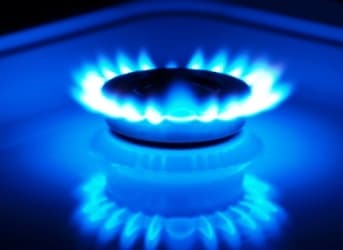The U.S. Department this week said it worked with ConocoPhillips and the Japan, Oil, Gas and Metals National Corp. on the extraction of natural gas from methane hydrate ice structures from the North Slope of Alaska. Scientists were able to coax natural gas out of the crystals by injecting carbon dioxide and nitrogen into ice formations. The U.S. energy secretary said the field test was just the beginning, but given the history of methane hydrates, it could replace fracking as the next major concern in the natural gas industry.
U.S. Energy Secretary Steven Chu said the team of scientists worked on the small-scale project to coax gas out of the ice structures like those found under the permafrost of the North Slope. Chu said that while this technology was in the very early stages of development, it could mark the beginning of the next natural gas revolution in the United States.
Chu's department described methane hydrates as a type of ice lattice that has natural gas locked inside. It's found under the arctic permafrost and at the bottom of the ocean on just about every continental shelf in the world. When it's coaxed into the liquid phase, be it from temperature or pressure increase, it gives up the natural gas. Chu equated it to the early developments in shale natural gas some 40 years ago. The United States holds some of the richest deposits of shale natural gas and, by Chu's logic, methane hydrate development could spark a similar gas revolution.
Potentially, however, that's where things get controversial. Two years ago, in mid-April, rig workers on the Deepwater Horizon in the Gulf of Mexico started introducing heat into a drilling column in order to set a cement seal at the well head. This heat may have sparked the reaction that the Energy Department described in its summary of methane hydrates. The heat for the cement could've melted the methane hydrate crystals, which in turn created a massive pressure increase inside the drilling column, pushing sea water, then gas and then oil shooting back up to the rig. That mixture hit an ignition source and the rest is history.
After the tragedy, alarm bells began sounding over methane hydrate as engineers and scientists searched for answers to the Deepwater Horizon tragedy. Two years later, the U.S. Energy Department has $6.5 million in funding for research to get at the natural gas inside methane hydrate formations. The work isn't just for the arctic waters in Alaska but in the U.S. waters of the Gulf of Mexico as well. Another $5 million was requested for next year.
Methane hydrate formations are abundant and could potentially represent at least twice what's available in known petroleum reserves globally. Not only did some of the witnesses to the Deepwater Horizon believe methane hydrates led to the explosion, however, its quick production may have interfered with efforts to control the leak. For those concerned about the negative consequences of oil and natural gas production, the few small earthquakes and trace amounts of harmful chemicals in drinking water associated with fracking are nothing when compared with the potential consequences of misapplied methane hydrate production.
By. Daniel J. Graeber



















I think you drastically understate the impacts of fracking.
Perhaps you need to read this: http://truth-out.org/news/item/9004-silencing-communities-how-the-fracking-industry-keeps-its-secrets